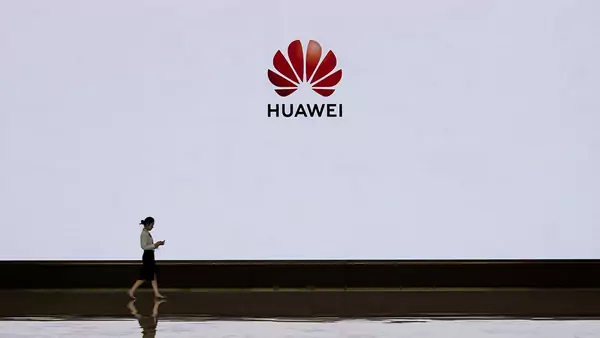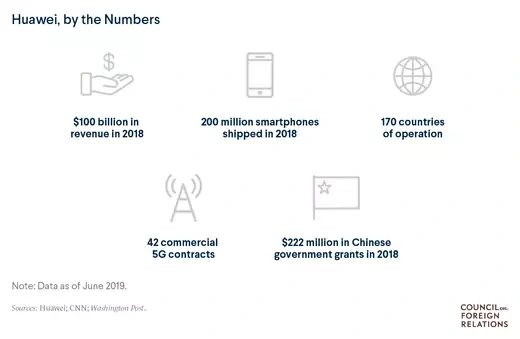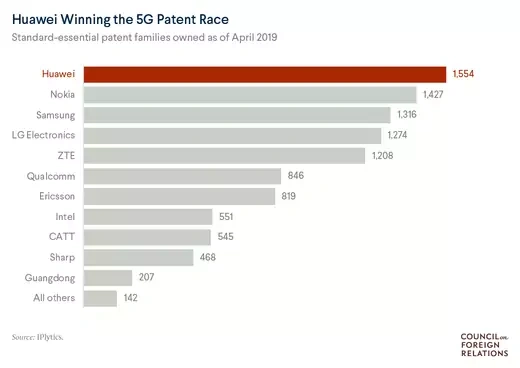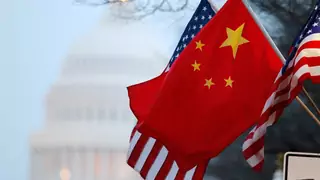 The Chinese telecommunications company faces accusations from President Donald J. Trump and other leaders that Beijing could use it for cyber espionage. The outcome of the struggle could shape the world’s tech and 5G landscape for years to come.
The Chinese telecommunications company faces accusations from President Donald J. Trump and other leaders that Beijing could use it for cyber espionage. The outcome of the struggle could shape the world’s tech and 5G landscape for years to come.
The Chinese telecommunications giant Huawei is central to the construction of new fifth-generation (5G) mobile networks around the world, yet its global influence has led the United States to raise concerns about whether the Chinese government could use the company to spy, or to sabotage critical infrastructure. Washington has led a crackdown on Huawei by enforcing nationwide bans on the company’s equipment and encouraging its allies to do the same.
Some experts warn that tensions between Washington and Beijing over technology could lead to a “digital iron curtain,” which would result in governments having to decide between doing business with the United States or China.
What is Huawei?
It is the world’s largest seller of telecommunications equipment, such as new 5G network infrastructure, and the second-largest smartphone maker. Based in Shenzhen, China, Huawei sells its products domestically and internationally. In the United States, it sells few phones but helps provide connectivity in some rural areas.
Ren Zhengfei, the company’s billionaire CEO, founded Huawei in 1987. With more than 180,000 employees, according to its website, Huawei claims to be a private company fully owned by its employees, though its precise ownership structure is unknown.
Why is it so controversial?
In recent years, the United States and several other countries have asserted that the company threatens their national security, saying it has violated international sanctions and stolen intellectual property, and that it could commit cyber espionage.
Cyber espionage. The main concern, according to U.S. intelligence agencies, is that the Chinese government could use Huawei to spy. Officials, primarily in the United States but also in Australia and several other countries, point to vague Chinese intelligence laws that could be used to force Huawei to hand over data to the Chinese government. (The United States has not publicly provided evidence that this has happened.) There are also concerns that Huawei’s 5G infrastructure could contain backdoors giving the Chinese government access to its inner workings and allowing Beijing to attack communications networks and public utilities.
A 2012 U.S. House Permanent Select Committee on Intelligence report [PDF] concluded that using equipment made by Huawei and ZTE, another Chinese telecommunications company, could “undermine core U.S. national security interests.” In 2018, six U.S. intelligence chiefs, including the directors of the CIA and FBI, cautioned Americans against using Huawei products, warning that the company could conduct “undetected espionage.”

At the heart of Washington’s concerns is 5G, the next generation of cellular networks, which will provide faster download speeds for smartphones, connect devices in smart cities, and support autonomous vehicles and robots. “5G is a different type of risk versus 4G or 3G. It’s much harder to separate the core from the periphery,” says CFR’s Adam Segal. “Once you have those risks, you have to trust the company much more. But it is difficult to trust Huawei, given the relationship between companies and the Communist Party.”
Intellectual property theft. U.S. companies and global telecom firms have for years accused Huawei of stealing trade secrets, starting with Cisco’s 2003 lawsuit alleging that its source code appeared in Huawei products. (The suit was later settled.) In 2017, a U.S. jury found Huawei guilty of stealing intellectual property from T-Mobile, and the U.S. Justice Department claimed in a 2019 indictment [PDF] that Huawei repeatedly tried to steal design information for a T-Mobile robot.
Trade violations. The United States claims that Huawei has long violated sanctions on Iran. A federal indictment unsealed in January 2019 against Meng Wanzhou, Huawei’s chief financial officer and Ren’s daughter, said that Huawei defrauded banks in order to do business with Iran and obstructed justice in the process by destroying evidence. Meng, who has denied the accusations, was detained in Canada in December 2018 at the request of the United States, which is seeking her extradition.
How much sway does Beijing have over tech companies?
The government has considerable sway over all Chinese private companies through heavy regulation, including the requirement that they establish Chinese Communist Party (CCP) branches within them, and state-backed investment. Executives of many of the biggest companies are party members, including Jack Ma of Alibaba and Huawei’s founder, Ren, who served as an engineer in the People’s Liberation Army during the Cultural Revolution.
Under President Xi Jinping, the lines between the public and the private have become even more blurred. Experts have observed that the CCP is working to boost its influence over private industry, especially tech companies. In recent years, foreign news organizations have reported that the government may start pressuring tech companies to offer the party direct ownership stakes and give party members even greater roles in management, though there is no evidence that this has happened at Huawei.
Some experts and U.S. officials also point to vague Chinese laws that could be used to force Huawei to help the government with intelligence gathering. For example, the National Security Law, enacted in 2015, states that citizens and enterprises have the “responsibility and obligation to maintain national security.” The 2017 National Intelligence Law [PDF] declared that Chinese companies must “support, assist, and cooperate with” China’s intelligence-gathering authorities.
At the same time, Huawei has distanced itself from the CCP, repeatedly asserting that its equipment has never been used, and will never be used, to spy. In January 2019, Ren made a rare media appearance, saying he “would never harm the interest of my customers” and that Huawei would not answer government requests for intelligence. In May 2019, Huawei commissioned a thirty-six-page legal report [PDF] from a Chinese law firm supporting its argument that it cannot be forced to spy, but other lawyers in China and around the world said the law has never been tested. The Chinese government has also gone to bat for Huawei, saying it would “take all necessary measures to safeguard” Chinese companies and pressuring Canada to release Meng from house arrest.
How did Huawei become so dominant?
Huawei became the world’s largest telecommunications company over three decades, reporting $100 billion in revenue in 2018, a 20 percent jump from the previous year. This success has helped drive suspicion that the Chinese government has played a role in the company in recent years.
In 1996, both the government and military began treating Huawei as an official “national champion,” a status reserved for firms that bolster China’s strategic aims. The move highlighted a shift in official policy. From then on, Beijing explicitly supported domestic telecom companies—and Huawei even more than others [PDF]—to prevent foreign domination of the industry. The Chinese government ensured Huawei had easy access to financing and high levels of government subsidies—$222 million in government grants in 2018 alone.

This cushion has allowed Huawei to price its network equipment below other companies’ rates. In the Netherlands, Huawei underbid Swedish firm Ericsson by 60 percent to provide network equipment for the national 5G network. Experts said that Huawei’s prices would not have even covered the cost of producing their parts without subsidies. Chinese state banks also provide countries low-interest loans to use Huawei’s equipment.
Huawei says its low prices are the result of technological expertise—a claim with some merit, according to industry experts. Huawei’s annual research and development (R&D) budget is among the world’s largest, and Ren says his firm spends more on it than most publicly listed firms can. At $15.3 billion in 2018, Huawei’s R&D expenditures rank alongside those of Alphabet (Google’s parent company) and Amazon.
How has the United States banned Huawei?
The United States has taken many steps to block Huawei. In 2018, the Donald J. Trump administration banned U.S. federal agencies from using the telecom giant’s equipment. (Huawei sued the United States over the restriction.) That same year, following pressure from regulators, AT&T walked away from a deal to sell Huawei’s smartphones.
U.S. actions against Huawei culminated with the Commerce Department adding the company to its “entity list” in May 2019, essentially banning Huawei from buying U.S. goods without the government’s permission. Huawei relies on American software, chips, specialty lasers, and other products. Days after the Commerce Department’s announcement, Google said it would restrict Huawei’s access to its products, including its Android operating system; a new Huawei phone unveiled later in the year didn’t come with Android apps. In August 2019, dozens of Huawei affiliates were also added to the entity list.
However, the Commerce Department has temporarily granted licenses for some U.S. companies, such as Microsoft, to continue selling their products to Huawei. The Commerce Department said in a November 2019 statement that the licenses have been granted for “specific activities which do not pose a significant risk to the national security or foreign policy interests of the United States,” but did not confirm how many licenses had been approved and for what companies. In addition, since Huawei was placed on the entity list, the Commerce Department has three times extended a ninety-day temporary general license that allows Huawei to continue limited work with rural U.S. telecommunications companies that depend on Huawei equipment. The latest extension is set to expire in February 2020.
In November 2019, the Federal Communications Commission (FCC) voted to designate Huawei and ZTE as national security risks, which would prevent rural carriers from using federal funds to purchase the tech companies’ equipment. Huawei filed a legal challenge in December, calling the effort “unlawful and misguided,” and the FCC’s decision has yet to be finalized.
U.S. Relations With China
1949–2020View Timeline
Can Huawei survive the bans?
It’s not just the United States that has banned Huawei. Washington has pressured its allies to prevent Huawei from developing 5G infrastructure in their countries, even threatening to stop sharing intelligence with countries that use Huawei. Australia and Japan effectively banned the company from building 5G networks in 2018. Other countries, such as Canada, the Netherlands, and New Zealand, are considering bans.
Experts expect that Huawei will survive the bans, including the U.S. blacklisting, but not without suffering damage. “It certainly will cause massive dislocations and probably loss of markets in the short term, but it’s unlikely to basically kill the company,” says CFR’s Segal.
At the same time, analysts say, U.S. companies could also be hurt by the bans. About 1,200 U.S. companies are Huawei suppliers, and U.S. telecom firms have said that banning Huawei products would set back the development of 5G in the United States by several years.
Why are some countries resisting the bans?
Other countries, especially those participating in China’s Belt and Road Initiative, are already using or have agreed to use Huawei’s equipment. The company has dominated 5G, providing high-quality networks for prices estimated to be 30 percent less than those of its competitors. It is also a leader in innovation, owning more patents [PDF] for 5G infrastructure than any of its competitors.
Russia’s 5G network will be built with Huawei’s help, and Malaysian Prime Minister Mahathir Mohamad has said the country will use Huawei’s technology. India has allowed Huawei to participate in the country’s 5G trials.
Authorities in potential markets, such as Germany and the United Kingdom, have argued that any 5G supplier comes with certain risks, given the nature of the networks. In January 2020, the UK government announced that it would allow Huawei to contribute some components in its 5G network, claiming it was able to minimize national security concerns and manage the risks of using Huawei. Officials in these countries also say they prefer to keep their auctions for 5G construction open to all firms and tighten security measures in general. “I am against excluding a company on principle but I am in favor of doing everything to ensure security and that, for example, includes a diversification of offers,” said German Chancellor Angela Merkel in December 2019.

No comments:
Post a Comment